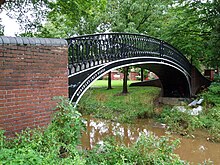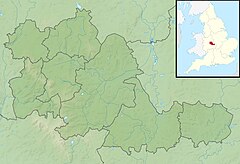Vignoles Bridge
| Vignoles Bridge | |
|---|---|

Vignoles Bridge
|
|
| Coordinates | 52°24′24″N 1°31′15″W / 52.40659°N 1.52077°WCoordinates: 52°24′24″N 1°31′15″W / 52.40659°N 1.52077°W |
| Carries | Pedestrian traffic |
| Crosses | River Sherbourne |
| Locale | Spon End, Coventry |
| Characteristics | |
| Design | cast iron arch bridge |
| History | |
| Construction end | 1835 |
| Opened | 1835 (moved 1969) |
Vignoles Bridge is a Scheduled Ancient Monument in the City of Coventry in the West Midlands of England. The bridge is a single-span iron footbridge over the River Sherbourne in the Spon End area, just to the west of Coventry city centre and 100 metres (330 ft) west-north-west of Sherbourne House (an office building in use by Coventry City Council).
Thomas Telford developed the first techniques for maximising the potential of cast iron as a construction material, realising that the lighter frames could use flatter angles and less substantial foundations than timber bridges while preserving the single span, and thus the navigability of the waterways they cross. English Heritage, which is responsible for scheduling ancient monuments in England, considers all examples of iron bridges "which retain significant original fabric" to be of importance. Vignoles Bridge is of particular interest because it "survives well and retains its original features thus demonstrating its engineering design and reflecting the manufacturing process", despite having been moved from its original site.
The bridge originally occupied a site on the Oxford Canal (which runs from Coventry to Oxford). It is cast iron and was built at Horseley Iron Works—whose name is cast into the span of the bridge on one side—in Tipton around 1835. The bridge, which was designed by Charles Vignoles (after whom it is named), was moved to its current site in 1969. The walkway is covered with tarmac and has cast iron balustrades either side, while the abutments connecting the bridge to the river bank are brick.
...
Wikipedia

